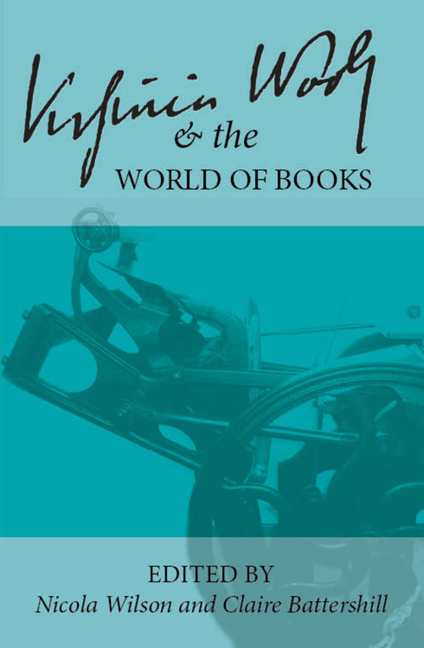 Virginia Woolf and the World of Books
Virginia Woolf and the World of Books Book contents
- Frontmatter
- Contents
- Introduction
- List of Abbreviations
- Keynote
- In the Archives
- Craftsmanship
- The Hogarth Press
- Hours in A Library
- The Art of the Book
- The Art of the Narrative
- Making New Books: Creative Approaches
- The Book in the World: Woolf's Global Reception
- Editing and Teaching Woolf
- Intertextuality
- Lives in Writing
- Taste and the Tasteful: Woolf, Radclyffe Hall, and the Culture of Queer Elitism
- Defining Life in Essays and Reports: “Mr. Bennett and Mrs. Brown” and the Government Reports on Infant Human Mortality
- “Penning and pinning”: Vita, Virginia, and Orlando
- Notes on Contributors
Taste and the Tasteful: Woolf, Radclyffe Hall, and the Culture of Queer Elitism
from Lives in Writing
- Frontmatter
- Contents
- Introduction
- List of Abbreviations
- Keynote
- In the Archives
- Craftsmanship
- The Hogarth Press
- Hours in A Library
- The Art of the Book
- The Art of the Narrative
- Making New Books: Creative Approaches
- The Book in the World: Woolf's Global Reception
- Editing and Teaching Woolf
- Intertextuality
- Lives in Writing
- Taste and the Tasteful: Woolf, Radclyffe Hall, and the Culture of Queer Elitism
- Defining Life in Essays and Reports: “Mr. Bennett and Mrs. Brown” and the Government Reports on Infant Human Mortality
- “Penning and pinning”: Vita, Virginia, and Orlando
- Notes on Contributors
Summary
When Radclyffe Hall's The Well of Loneliness went on trial for obscenity in 1928, E. M. Forster drafted a defense that was published in the Nation on September 8 of that year. Virginia Woolf, having reluctantly signed, wrote in frustration to Vita Sackville-West: “now it appears that I, the mouthpiece of Sapphism, write letters from the Reform Club!” (L3 530). It is understandable, if not exactly laudable, that Woolf would be anxious about the public insinuation of her sexual nonnormativity. What is even more telling, however, is her disparaging reference to the Reform Club itself. Although Forster was part of the progressive political collective, so too were Arnold Bennett and H. G. Wells, whose writing Woolf had famously dismissed as, among other things, too reform-minded. For Woolf, literature with an explicitly reformist agenda was decidedly middlebrow. In “The Novels of E. M. Forster,” she goes as far as to define “two great camps to which most novelists belong”: “preachers and teachers” and “the pure artists” (“Novels” n.p.). The word “pure” here is telling: by contrast, reformist writing is not only aesthetically mediocre, it's downright dirty. Although Woolf's committed opposition to censorship led her to sign Forster's letter and agree to testify at Hall's trial, she feared association with those literary reformers—Hall included—whose middlebrow social novels were, for Woolf, perhaps even filthier than queer sex.
Yet it is difficult to determine whether, for Woolf, sexual indiscretion or literary mediocrity was the more egregious sin. While Woolf is often retrospectively claimed as a sexual liberal by virtue of her extramarital relationship with Vita Sackville-West and her closeness with notorious libertines like Lytton Strachey and Duncan Grant, Woolf 's scrupulous self-censorship, the comparative sexual reticence of her novels, and her apparent dismissal of overt sexual nonconformists like Radclyffe Hall underscore Woolf 's insistence that sex is a private matter best left out of public discourse. Furthermore, as revealed by Woolf 's less-than-enthusiastic involvement in Hall's obscenity trial, her idea of what was sexually tasteful happened not-so-coincidentally to align with the aesthetics of “high” literary taste. Here I argue that Woolf, by maintaining the notion that “high art” should deal only indirectly with sex (let alone queer sex), inadvertently helped to create what I term a culture of queer elitism.
- Type
- Chapter
- Information
- Virginia Woolf and the World of BooksSelected Papers from the Twenty-seventh Annual International Conference on Virginia Woolf, pp. 276 - 282Publisher: Liverpool University PressPrint publication year: 2018
